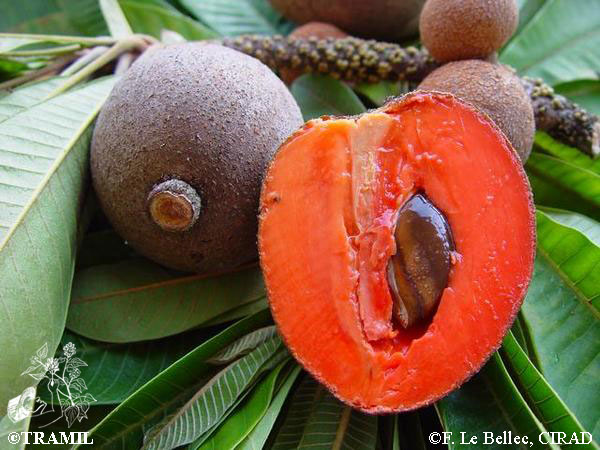TRAMIL: Program of Applied Research to Popular Medicine in the Caribbean
TRAMIL: Program of Applied Research to Popular Medicine in the Caribbean
Authors: Gerardo Cebrián-Torrejón1, Michelle Salas Pinel1,2
1 Laboratoire COVACHIM-M2E EA 3592, Université des Antilles, 97157 Pointe-à-Pitre Cedex.
2 Forest engineer. Heredia. Costa Rica.

The Applied Scientific Research Program of Medicinal Plants, known as TRAMIL, is an investigation program of traditional and popular medicine from the Caribbean, whose purpose is to rationalize health practices based on the use of parts of medicinal plants, in order to offer a tool for the training of physicians, pharmacists and health personnel, especially those linked to primary care programs.
This multidisciplinary network created in the 80’s, has developed a research program with the aim of valorization and to make available traditional knowledge of the uses medicinal flora of the Caribbean have as practical and affordable treatments which harmonize with the popular traditions of the Caribbean Basin.
The main objective of TRAMIL is to assure the access of a practical ethnopharmacological knowledge of the local flora – validated previously by scientific methods -, to the local people, medical and paramedical staff and the academy or institutions related to health and environmental conservation. As well as to present popular herbal medicine as an complementary resource to allopathic medicine, and fight for the value of the Caribbean culture and ancestral traditions.
The network places great effort in developing social projects, as well as in the elaboration and diffusion of diverse documents in almost all the languages of the Caribbean Basin. The main product that stands out is the Caribbean Herbal Pharmacopoeia published in English, Spanish and French, which is the result of the effort of TRAMIL to validate scientifically the ethnopharmacological uses of parts of local plants. In order to achieve this goal, TRAMIL developed a survey methodology that collected the information related to the local beliefs, knowledge and practices in the use of parts of plants as a medicinal resource, incorporating pharmacological information that allows to identify and alert about the toxicological aspects of certain forms of uses.
TRAMIL collects popular medicine information through a qualitative/ quantitative ethnopharmacological survey, based on the main health problems in the community studied. Nowadays, TRAMIL has carried out more than 11,000 semi-structured interviews in 27 different territories (Antigua, Barbados, Belize, Colombia, Costa Rica, Cuba, Dominica, French Guyana, Grenada, Guadeloupe, Guatemala, Haïti, Honduras, Jamaica, Martinique, Nicaragua, Panama, Providencia, Puerto Rico, Quintana Roo, San Andrés, República Dominicana, Saint Lucia, Saint Vincent, Trinidad & Tobago,Venezuela and Curazao) over the last 35 yearsstudying the populations of the Caribbean Basin.
The list of health problems in primary care is analyzed by a local multidisciplinary group of health professionals (doctors, nurses, mothers, pharmacologists, toxicologists, social workers, ethnobotanists, ethnologists, phytochemicals, statisticians, pharmacists and social referents), with the objective of optimizing their adaptation to the idiosyncrasy and local epidemiology. Once the health problems to be screened are selected, the population is randomized (covering 10% of the households in each community), and semi-structured interviews take place with the person responsible for health in each house or cohabiting group and performed by an interviewer that should not be part of the health sector to avoid any interference.
Once all the information is gathered, the multidisciplinary work team proceeds to the analytical studies, starting with the plant species used in the treatment of each health problem and the methods of preparation, in order to know the efficiency and efficacy of the use of certain plants for the treatment of some specific health problem.
At present, there are more than 500 described uses, with a significant incidence (≥20%); among them we can find 393 recommended uses, and 6 toxicity alerts, for 130 species already published and other species are placed in the research category, and its study is in progress. All the medicinal species cited in the interviews, (mostly known by their local or vernacular common names) are identified by taxonomists from each country, and a specimen is deposited in the country’s reference herbal collection. In parallel, a specimen is deposited in the collection of the Herbarium of the Botanical Garden of Santo Domingo (JBSD) in the Dominican Republic.
It is supported by the meticulous study of bibliography and carries out biological and chemical tests to validate the actual and current practices in the use of plant parts as a medicinal resource of the population, described in the Caribbean Herbal Pharmacopoeia. These studies are carried out through an active network of altruist collaborations between people, university research, laboratories and local companies that are part of the TRAMIL network.
As a result of this titanic work made with the collaboration of more than 200 specialists in the last 35 years; TRAMIL researchers have done experiments (TRIGS) in order to validate 536 results that have been included in the monographs of the Pharmacopoeia, allowing in this way the integration of popular knowledge of the inhabitants of the Caribbean Basin, constituting a training tool for students, doctors, pharmacists and health personnel in general impacting the programs of health in the countries and territories of the Caribbean Basin.
References:
-
Pharmacopée Végétale Caribéen 3ème édition. 2014.TRAMIL.
-
Boulogne I., Germosén-Robineau L., Ozier-Lafontaine H., Fleury M. Loranger-Merciris G., J. Ethnopharm. 2011, 133, 1039-1050.
-
Picking D., Delgoda R., Younger N., Germosén-Robineau L., Boulogne I., Mitchell S. J. Ethnopharm. 2015, 169, 314-327.
-
Nossin E., Cebrián-Torrejón G., Gavillan Suarez J., Medina M., Harold Gomez H, Rafael Durán R, Mariana Costaguta M. Revista Steviana, in-press.
1 comment
[…] Zonako medikuntza popularra ikertu, ebaluatu eta katalogatzeko proiektua jarri du abian 2015ean sortutako Antilletako Unibertsitateak, Frantziarren Antilletan eta Guyanan dagoena. Proiektuko bi partehartzailek azaltzen dute. TRAMIL: Program of Applied Research to Popular Medicine in the Caribbean […]